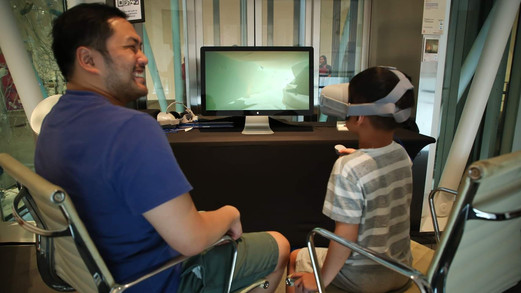Want to move people toward action? Alter their reality
- Ashima Thomas
- Apr 15, 2019
- 2 min read
Updated: Aug 22, 2019
In January of 2018, we debuted the virtual reality (VR) experience Oceans We Make at the ArtScience Museum, Singapore as part of the MeshMinds 1.0: ArtxTechforGood exhibition. It's an interactive underwater journey that starts off in a pristine reef but ends in a very different place, intended to convey the immensity of the plastic pollution problem in our oceans.
We were surprised by how effective it was, in just three-minutes.
Most people were trying virtual reality for the first time and we expected to have many post-experience conversations about the technology itself.

Instead, people would remove the headset and immediately start talking to us about their own experiences with plastic; recalling memories of littered beaches, shocking scuba dives, and recent trips to the supermarket.
Oceans We Make went on to win an award, travel around the world and continues to draw inquiries for showcases from schools, conferences and events. In a survey of its impact, 84% of participants rated it 8 out of 10 or higher for how concerned it made them feel about plastic pollution.
We thought that if our VR piece drew participants into reflecting on their own experiences and behaviours, then perhaps we had an opportunity to reinvent the way we persuade people to think about plastic pollution.
So, we expanded on the #beatplasticpollution theme by creating a companion VR experience called Oceans We Save, and an augmented reality app, Our Ocean Life.
We designed each experience to spark different emotions about plastic pollution. But the pieces would remain connected by four fundamental features: they would be fun, interactive, beautiful and have an unexpected ending.
And so, Discover Our Oceans was born.
It's a collection of immersive experiences that leverage the power of augmented and virtual reality to remove us from our immediate surroundings and take us into the realms of wonderment and awe.
It is in these rarely felt states that we are more susceptible to messages, like those that remind us that the earth is beautiful and fragile and that we can protect it if we want to.
We recently debuted Discover Our Oceans as an "immersive zone" at the ArtScience Museum, Singapore for the MeshMinds 2.0: ArtxTechForGood exhibition.
We wanted to bridge the virtual worlds with reality, and so we worked with high school art students from United World College of Southeast Asia, Dover Campus. They created ocean-themed sculptures from plastic donated by their community to place within the zone. The sculptures proved to spark curiosity about plastic pollution and the immersive zone itself.
During the 10-day exhibition, Our Ocean Life led a public vote for the best experience among eight other AR and VR pieces. And by all anecdotal accounts, Oceans We Save and Oceans We Make lived up to their fundamental promises of being fun, interactive, beautiful and unexpected.
But, the best validation came when a woman approached us more than an hour after trying Oceans We Save. She expressed her disbelief about the rate at which we use plastic bottles - the central theme of the experience - and said that she couldn't stop thinking about it.
If you'd like to showcase Discover Our Oceans or any of the individual experiences, contact us.
You can download Our Ocean Life on your iPad here.
We are aiming to make it available on more devices soon.



























































People entered the new year of 2021 with some old problems. Laptop repairing and mobile repairing is one of the very important issues that need to be addressed.